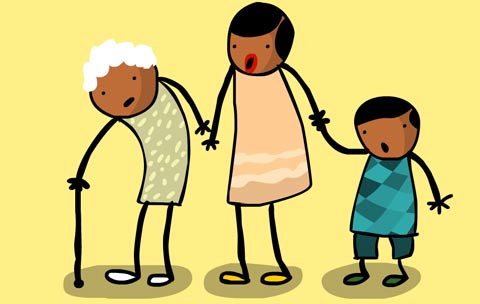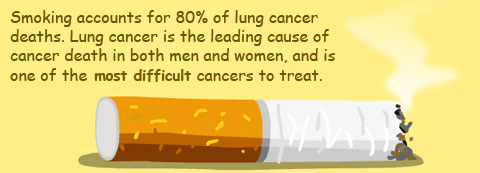 |
What causes cancer?
What causes tumors? What conditions make cancer-development easy? What are the cancer risk factors? Good questions.
There is not a single answer for this, but experts know that cancer is not contagious, and isn't caused by germs, like colds or the flu. There is a kind that is caused by a virus from unsafe sexual activity, but we will look at that later. Do not be afraid of other people with cancer.
Each cancer type is different and that means the causes vary. For example, lung cancer may be caused by inhaling tobacco smoke, or toxic chemicals. Inhaling the same chemicals will not give you cervical cancer. In the same way, exposing your skin to intense sunlight can cause melanoma (skin cancer) but can never give you lung cancer. With this in mind, let us see a few general causes of cancer.
 Genetic make up (inheritance) Genetic make up (inheritance)

Every person inherits some genes from their parents. If you inherit an abnormal gene (called a mutation), there is a 10% chance that, that abnormal gene will help cancer formation if the conditions are right. Specialists call this genetic predisposition. Breast cancer genes are examples of genetic predisposition. Women who carry one of these abnormal genes have a higher chance of developing breast cancer than women who do not.
 Smoking and second hand smoke Smoking and second hand smoke
Secondhand smoke is a known human carcinogen. Tobacco smoke contains more than 7,000 chemical compounds. More than 250 of these chemicals are known to be harmful, and at least, 69 are known to cause cancer.

 Age Age
No, age does NOT cause cancer (laugh)
Sometimes the changes that make a cell become cancerous in the first place take a long time to develop. There has to be a number of changes to the genes within a cell before it turns into a cancer cell. These changes can happen by accident when the cell is dividing. Or they can happen because the cell has been damaged by carcinogens and the damage is then passed on to future cells when that cell divides. The longer we live, the more time there is for genetic mistakes to happen in our cells.
 The immune system The immune system
People who have problems with their immune systems are more likely to get some types of cancer. Example, people with organ transplant, people living with HIV or AIDS or even people with rare medical syndromes which affect their immunity. Some cancers such as cervical cancer and other cancers of the genital or anal area, some lymphomas, liver cancer and stomach cancer. Lymphomas are caused by viruses. This means that with a low immune system, viruses attacking your cells are able to divide without control and are more likely to develop genetic faults and develop into lymphomas.
 Body weight, diet and physical activity Body weight, diet and physical activity
Many people in the western world eat too much red and processed meat and less fresh fruit and vegetables. This eating habit is known to increase the risk of cancer. Drinking alcohol can also increase the risk of developing some types of cancer.
 Bacterial infection Bacterial infection
Recent studies have shown that people who have helicobacter pylori (H pylori) infection of their stomach develop inflammation of the stomach lining, which increases the risk of stomach cancer. Infection can be treated with antibiotics, but when left for so long, it can cause damage to many vital organs and make the cells in that area vulnerable for cancer formation
 Day to day environment Day to day environment
There are many things and chemicals all around us that may in many little ways make us cancer prone. These include the sun, natural and man-made radiation, workplace hazards like chemicals and smells, asbestos and others. Some of these are avoidable and some aren't.
 Viruses Viruses
Viruses can help to cause some cancers. But this does not mean that these cancers can be caught like an infection. What happens is that the virus can cause genetic changes in cells that make them more likely to become cancerous.
In summary, cancer is a bit complex and no one thing is known to cause it. Keeping well, eating healthy, avoiding chemical inhaling, zero smoking, staying away from sexual activity until you are married or old enough to do so, and general personal care can largely reduce your exposure to sexually transmitted infections and minimize your risk of cancer.
 |
 |
